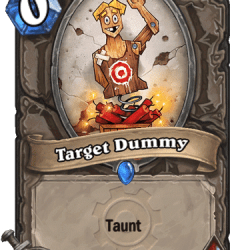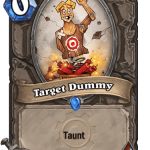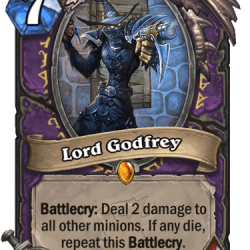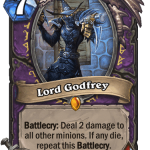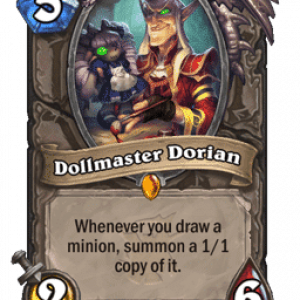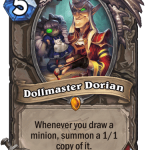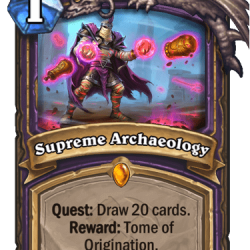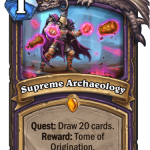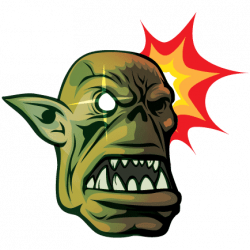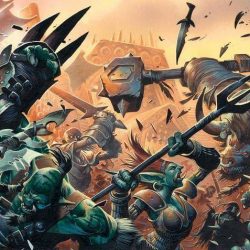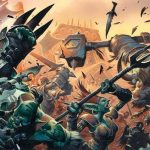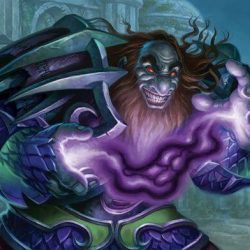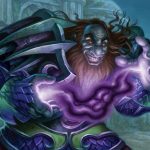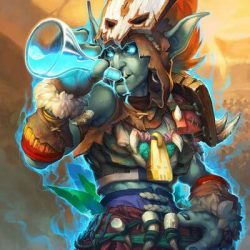- January 25, 2020
- By neon31
- In Guest Post, Guides
- No Comment
- 0
[Wild Meta Guide] Mecha’thun Warlock
Intro
Hello and welcome to the first edition of Hearthstone-Decks.net’s Wild Meta Guide. You might be wondering why this article is classified as a “Meta Guide,” rather than the usual “Meta Report”. We feel typical Meta Reports are too simplistic and are insufficient in explaining why a deck is well-positioned in the meta. They focus mainly on explaining the surface of the deck and its general gameplan, rather than producing a quality and in-depth article that highlights the deck’s advantages/disadvantages, nuances, deck theory, and much more. We feel that there is room to improve with regard to writing Meta Reports, and therefore we decided to classify what we produce as Meta Guides, which is a Meta Report containing several articles, each pertaining to a certain class/deck.
We will refrain from classifying decks and classes under the standard “Tier List” system. We feel that Tier Lists are arbitrary and don’t hold value in a format like Wild. It is often not clear what deck is the best or which deck is better than the other, as a result Tierlists can look radically different from each other thanks to select pocket metas that are commonplace in Wild.
We will simply provide you on how we feel on the current Wild Metagame, showcase decklists containing the most optimal cards and which will perform the most consistently across most pocket metas whilst explaining the reasoning behind decisions on certain card inclusions and exclusions. Ultimately, you can make the final decision on what you feel is the best and which deck you would prefer to ladder with.
Deck archetypes are ordered by strength with the strongest variant of a deck in mind. Most decks contain multiple variants, which may differ in viability or may be intended to counter different metas. Understand that the 4th most viable variant of, for example, Shudderwock Shaman, may not be better than the strongest variant of a weaker archetype.
It is of utmost importance to us that every single deck list is credited to the correct creator. If a deck of yours was wrongfully credited to someone else, feel free to reach out to us here hearthstone-decks.net/discord
[1] A short introduction
Mecha’thun Warlock is currently the most popular Warlock deck on the ladder, beating Cube Warlock in popularity, despite being slightly weaker than Cube Warlock. Many players seem to enjoy the deck’s playstyle, which revolves around cycling through your entire deck incredibly fast – often emptying the entire deck by turn 10 – whilst simultaneously preparing the required tools to perform the Mecha’thun combo. Finally, players destroy their opponent with a Mecha’thun combo which usually involves Emperor Thaurrisan ticks on Bloodbloom and Mecha’thun itself.
Mecha’thun Warlock decks can be divided into two subcategories, Cycle and Demon. Sadly, Demon variants are almost obsolete, as it has been uncovered that a variant that focuses on cycling through the entire deck as fast as possible is the better way to play the deck. It turns out that taking the SN1P-SN4P Warlock shell and replacing the SN1P-SN4P combo cards and supporting Mechs with Mecha’thun combo cards creates a deck that is pretty darn powerful, consistently being able to perform a combo by turn 10.
Regarding the mulligan, it’s fairly easy. You want to always keep Kobold Librarian, no matter what. Against aggro you’re looking for your removals and the other one drops to make sure you fight for board early, and vs slower decks you want to find Valdris to make sure you can play it as soon as possible, since breaking the card limitation allows you to play more cards, and thus cycle faster toward victory.
[2] Cycle Mecha’thun Warlock
Cycle Mecha’thun Warlock, without the Quest, is what we consider the best version of the deck right now. Valdris Felgorge has proven to be a revelation, so much so that Hijodaikan invented and popularised this version we feature which opts to include Target Dummy, which synergises very well with Valdris Felgorge.
What stands out in Hijodaikan’s version is the inclusion of Target Dummies and the exclusion of cards such as Soularium; Lord Godfrey; and Hemet, Jungle Hunter.
The Target Dummy looks like a meme from the outside, and you are probably thinking, “Why does your Grandpa run THAT pathetic card in his deck?” The answer to that question would be “My Grandpa’s deck contains no pathetic cards!!”. Mecha’thun Warlock is a deck that draws a lot, and this involves many Life Taps. Target Dummy helps Mecha’thun Warlock keep its hand empty, preventing overdraws. Target Dummy also synergises well with Valdris Felgorge, enabling us to play Valdris as soon as possible without fearing overdraws. Additional benefits are that Target Dummy is very good against Aggro decks as it can be used to prevent large weapons from swinging face, and provides excellent support for Defile and Plague of Flames, two of the best clears in the deck. Notably, Zilliax can also magnetise onto a Target Dummy to create a 3/4 Zilliax, which can prove crucial against token/aggro decks.
Soularium is excluded because the matchups it is good against don’t really exist anymore. You already draw through the entire deck by around turn 10, so Soularium is a waste of a deck space. It was originally added to decklists to counter Dirty Rat decks such as Reno Warlock and Reno Mage. Soularium meant that the combo could be performed 3 turns earlier than usual. With the way the meta has shifted, Reno Warlocks are all but non-existent after getting power crept by almost everything else. Reno Mages these days are not focused around disruption, stalling and fatigue gameplans – they just kill you. Mecha’thun Warlocks should be more worried about staying alive vs. Reno Mage, rather than having a dead card in their hand for most of the game.
Valdris Felgorge, which is essentially a Soularium that can be played at any point in the game (provided you have the mana), has also replaced Soularium’s effect, as you don’t have to worry about discarding important combo pieces and Valdris provides more room for Life Taps.
Lord Godfrey is excluded because Zephyrs out classes it. Zephyrs is usable around turn 7, so you could just use Zephyrs to discover a Brawl to clear the board, which achieves essentially the same thing as Godfrey. Zephyrs also buys us some time against albatross warlock since they will usually start playing the birds out once you’re in fatigue to deny your combo (because pro tip, the combo doesn’t work as long as there’s an albatross on their board), or atleast save up n’zoth for this moment , provides weapon removal against Cube Warlocks and Secret Mages, and can stall the game and enable the Mecha’thun Warlock to draw through their entire deck. Additionally, Zephyrs can be used to clear large boards created by Darkest Hour, where Godfrey is usually useless, and can be tempoed out early on to fight off aggro decks. Although a Bloodfen Raptor isn’t the best, it’s still something.
At the end of the day, it is more about preference here, as both Zephyrs and Godfrey are good at what they do, but Zephyrs is much more flexible and therefore makes the cut. Godfrey is better against tokens, so if you face many Aggro decks that go wide, he could potentially be better.
Hemet, Jungle Hunter is simply too high rolly. It is not a good strategy to try to throw all your eggs in a basket and pray you draw Hemet on turn 6, because that strategy is not very consistent. You are much better off running many Cycle cards to try and ensure you draw your entire deck by turn ten, rather than running a single card that attempts to do the same job, poorly. You need to have drawn at least a single Bloodbloom, meaning Hemet is often not playable until after turn six.
You already draw the entire deck by turn ten nearly all the time except against Aggro (where Hemet isn’t good either, for obvious reasons), like Soularium, Hemet doesn’t serve any purpose whatsoever.
Plot Twist+Dorian Cycle Mecha’thun Warlock has recently been popularised on the Americas server by Guldaniel and RottedZombie. The main advantage lies in how the combo is set up and performed itself. It runs most of the same cards Hijodaikans deck uses, but opts to exclude Emperor Thaurissan in favor of Dorian+Plot Twist as its combo enabler. Because Dorian + Plot Twist costs only seven mana, you can squeeze in a Soularium and Bloodbloom to be able to perform the combo for a total of 10 mana, or potentially combo on turn 9 if you drew really well, which is pretty relevant in the Reno Quest Mage match-up to go under Vargoth+Time Warp at times.
What stands out from this new variant is obviously the Plot Twist, Dollmaster Dorian, and Soularium inclusions as well as exclusions such as Emperor Thaurissan.
Plot Twist and Dollmaster Dorian’s uses were explained above, but what we should ask ourselves is “Is it even worth it?” We think it’s not, because you are adding three cards that try to achieve the same thing Emperor Thaurissan can achieve by itself, and Soularium is too slow for the rate at which current Mecha’thun Warlocks decks cycle through the deck. Regardless, it is still worth experimenting with, and it is certainly an interesting gimmick deck that doesn’t stray too far from its cousin. You should still be able to ladder fine with this variant, even if it is slightly suboptimal.
[4] Quest Cycle Mecha’thun Warlock
Quest Cycle Mecha’thun Warlock was created and popularised by Memnarch and quickly had a meteoric rise to the top in terms of play rate. It is one of the most popular decks on ladder, surpassing Secret Mages at times at certain ranks. However, the Quest variant, to put it bluntly, is suboptimal. The Hero power you get from completing the Quest, which by itself is a huge task, is simply not worth it. We cannot stress how bad it is to actively make your combo deck worse just to be able to add six mana 4/6 Taunt to your deck.
If you play a few games of Cycle Mecha’thun Warlock, you will quickly realise that the deck’s biggest weakness is not healing, drawing, or board clears, it’s getting outpaced by other Mecha’thun Warlocks and Reno Quest Mages. So, why you would even bother with Quest shenanigans is a question for the scholars. Despite having been proven to be suboptimal, it is surprisingly the most popular variant of the deck. People just really love their memes.
The advantages compared to other builds of Mecha’thun Warlock are limited: 6 mana 4/6 taunt that heals for four, 2 mana 2/3 draw a card, and the chance to maybe sometimes discount a combo piece to 0 mana.
The disadvantages are much more numerous. Having to run two Plot Twists and two 6 mana 4/6 taunts (terrible cards) whilst sacrificing one card in the mulligan that could be the game winning board clear against Aggro, is incredibly off-putting. Your turn 1 play, which is very important, is essentially wasted. Using maximum mana each turn is something you generally want to do with Mecha’thun Warlock. For example, using Mortal Coil or playing a Kobold Librarian to contest the board will often save you a lot of health points. The main one, and the one that really matters, is that you lose to Cycle Mecha’thun Warlock, because completing the actual quest and finding space in your deck for all the support cards decreases the speed at which your deck cycles and slows down your combo by a few turns. It cannot be stressed how important it is for Mecha’thun Warlocks to be able to perform their combo ASAP – a single turn delayed could mean winning or losing.
[5] So, how do you consistently beat Mecha’thun Warlock?
If your deck attempts to perform a game winning combo by turn ten, you will do relatively well against Mecha’thun Warlocks. Decks that perform well versus Mecha’thun Warlock are Reno Quest Mage, Cyclone Quest Mage, as well as other Mecha’thun Warlocks. All these decks are usually able to perform their combos by Turn 10, or in the case of the Mage decks, even earlier: in the specific case of Cyclone Quest Mage, as early as a turn six shutdown with multiple giants, if it high rolls hard enough.
You will also do well against Mecha’thun Warlocks if your deck is able to mount unbearable volumes of pressure in the early game/mid game. Decks such as Darkest Hour Warlock perform very well against Mecha’thun Warlocks. Darkest Hour Warlock is slightly high rolly since it relies on drawing a specific set of cards to be able to do broken things, but that’s the case for all the best decks in wild these days. Just play around Plague of Flames and don’t overly trade. Even if you don’t happen to find the combo early, you can save your Nerubian Unravelers for when they’re about to combo, and they’re likely to stick since you likely exhausted most of their removals with your other threatening minions by this point. Mecha’thun Warlock’s minions are never going to be life threatening, so try to squeeze in as much damage as you can.
Aggro decks, Control decks, and Combo Disruption tactics don’t do well against Mecha’thun Warlock. You would think a Warlock deck without Voidlords would fold to any Aggro deck. This is far from the truth. Mecha’thun Warlock does superbly against Aggro decks, even being able to race Secret Mages thanks to the powerful board clears and sustainable cheap healing while simultaneously being able to draw the entire deck and setup the Mecha’thun Combo.
Control decks don’t really exist in Wild anymore. Mostly only Odd Warrior and Jade Druids that can be classified as a Classic Control deck, and that is a loose definition of the term. Anyways, you can probably see why both these decks are bad versus Mecha’thun Warlock; they don’t apply any pressure in the early game or mid-game so it’s easy strolling for the Mecha’thun Warlock player.
Combo Disruption Tactics like Dirty Rat are inconsistent; Mecha’thun Warlocks runs a lot of cheap cycle minions and these dilute the chances that Dirty Rat will pull Mecha’thun or Emperor Thaurrisan. Decks that revolve around disrupting the opponents combo are too slow. Treachery Warlock is the most notable example of this sort of deck and it is terrible against Mecha’thun Warlock. This is mainly because Mecha’thun Warlock draws through almost its entire deck in the average time it takes for you to perform the Treachery+Fel Reaver combo. Mechath’un Warlock draws so fast, in fact, that Emperor Thaurrisan is usually played on turn eight. This is the turn the Treachery+Fel Reaver combo is usually performed, meaning your Fel Reaver+Treachery combo is detrimental as it just brings the Mecha’thun Warlock closer to having an empty deck.
Decks that revolve around summoning multiple Albatross’ such as the recently popularised Albatross Betrug Cube Warlock do very well against Mecha’thun Warlock. Probably the best card against Mecha’thun Warlock is Mojomaster Zihi. It’s not very popular these days, but a well timed Zihi can win the game on the spot.
⠀
Thanks for Reading!
This writeup is only a small part of our Wild Meta Guide containing almost 30 others covering all of the best Wild Decks and Strategies –
Stay tuned for more info on the release date of the Wild Meta Guide!
A Guide by hijo, memnarch, vandelay, lulnenko and neon31.
Discord | Twitter | Patreon | Top Wild Decks
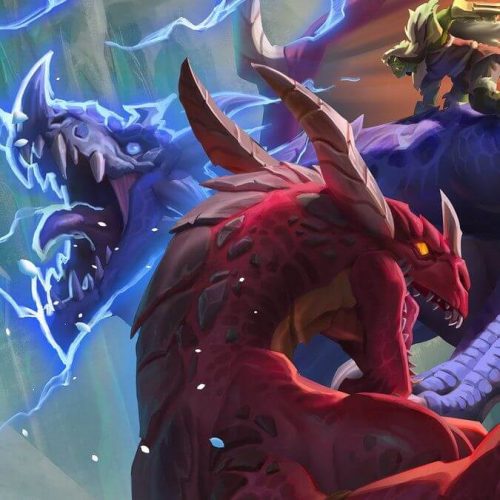
You might also be interested in...
Submit your Top 500 Legend Build, be seen by thousands of people!
Check out the Bazaar "the first free to play Hero-Builder for PC and Mac" Beginner's Guide! https://bazaar-builds.net/the-ultimate-beginners-guide-to-the-bazaar-tips-strategies-and-more/


![[BIG] Mecha'thun Warlock - A wild Meta Guide](https://hearthstone-decks.net/wp-content/uploads/2020/01/BIG-Mechathun-Warlock-A-wild-Meta-Guide.png)




